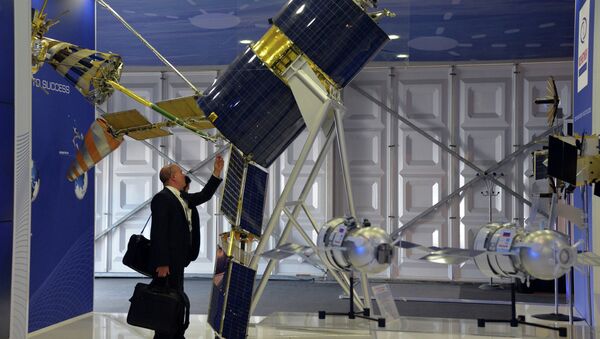"The ISS, as the developer and manufacturer, is offering Latin American customers a possibility to create such a system. If we speak specifically about Brazil, it will take for a subscriber to wait for a communication session for 6-18 minutes in case of one regional station and twelve spacecraft in orbit. Following the deployment of the whole orbital [system] consisting of 24 satellites and two or three ground stations, the waiting time will reduce to almost zero," Testoyedov said.
The ISS is currently participating in the Latin American Defense and Security Exhibition LAAD 2017 in Brazil.
The Gonets-M satellite communication system is aimed at providing communications and data transmission services and it can be also used for ecological, industrial and scientific monitoring purposes. According to the manufacturer, satellites of this series make telephone and fax communications services available to users within the satellites’ coverage area, as well as facilitate user's geopositioning with the help of GPS or GLONASS technologies.
According to Testoyedov, the ISS is also ready to resume talks with Brazil on the joint development of spacecraft, which will be launched from the Alcantara Launch Center using any type of carrier rockets.
"The ISS together with Ukrainian partners earlier actively participated in the development of the Alcantara Lauch Center. We were responsible for the development and manufacturing of communication satellites for the first launches from Alcantara and development of a communication system for Brazil… We are ready to continue talks with the Brazilian side on a joint development and manufacturing of spacecraft to be launched from Alcantara using any carrier rocket," Testoyedov added.
ISS-Reshetnev was founded in 1959 as part of Sergey Korolev’s OKB-1 Special Design Bureau of Research and Development Institute. Named after Korolev's close associate, Mikhail Reshetnev, the company was initially supervising ballistic missile designs, and later began to develop launch vehicles and satellites. It is a leading Russian provider of satellites for a wide range of applications including communications, television broadcasting, navigation and geodesy.
Russia's Reshetnev Information Satellite Systems company plans to deliver six new Gonets telecommunications satellites this year to upgrade its fleet, its director said.
"All six satellites are at different stages of production. The delivery of the apparatuses to the customer is planned for the end of 2017," ISS-Reshetnev Director General Nikolay Testoyedov said.
Testoyedov said the work on the state contract is proceding on schedule.
The Gonets low-orbit grouping of 12 telecoms satellites is designed to assist in transferring information from compact devices. The Gonets-D1M are expected to replace the Gonets-M and Donets-D1 currently in orbit.
Russia's Reshetnev Information Satellite Systems company plans to prepare for launch the first of nine cutting-edge Glonass-K1 navigation satellites by next year, its director told Sputnik.
"The manufacture of nine spacecraft in the Glonass-K1 series comes with the use of domestic and accessible foreign hardware components. The work is carried out in accordance with the approved schedule with the start of launches in late 2018," ISS-Reshetnev Director General Nikolay Testoyedov said.
Glonass-K1 is the third generation of GLONASS navigation satellites. The satellites boast an increased lifetime of 10-12 years, a reduced weight of 2,000 pounds and offer an additional L-Band navigational signal.
Glonass is a satellite navigation system operated by the Russian Aerospace Forces. An alternative to the United States’ Global Positioning System (GPS), the Glonass network provides real-time positioning and speed data for surface, sea and airborne objects around the globe.
Never miss a story again — sign up to our Telegram channel and we'll keep you up to speed!



